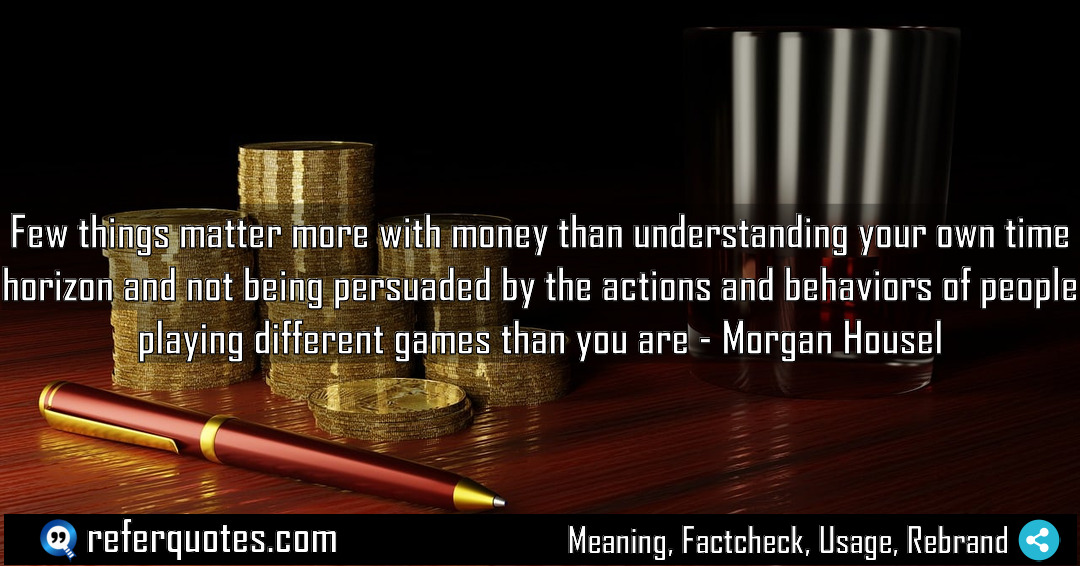
Few things matter more with money than understanding your own time horizon. It’s about knowing the game you’re playing and not getting distracted by the noise from other people’s completely different financial strategies.
Share Image Quote:
Table of Contents
Meaning
This quote is about the critical importance of aligning your financial decisions with your personal goals and timeline, while actively ignoring the distracting and often irrelevant actions of others.
Explanation
Let me break this down for you. The “time horizon” part is everything. Are you investing for retirement in 30 years? Or saving for a house down payment in 3? That single factor should dictate 90% of your strategy. The second part—the “different games”—is what trips up so many smart people. You see someone on Reddit making a killing on crypto in a week and you think, “Why isn’t my index fund doing that?” But you’re not playing the same game. They might be a 25-year-old speculating with fun money; you’re a 45-year-old preserving capital for your kids’ college fund. Comparing the two is like a marathon runner getting frustrated that a sprinter is faster off the starting block. It’s a different sport entirely. You have to have the discipline to stick to your own playbook.
Quote Summary
Reading Level55
Aesthetic Score65
Origin & Factcheck
This wisdom comes directly from Morgan Housel’s fantastic book, “The Psychology of Money,” which was published in 2020. It’s a modern classic for a reason. You might see the sentiment echoed elsewhere, but this specific phrasing is Housel’s.
Attribution Summary
Where is this quotation located?
| Quotation | Few things matter more with money than understanding your own time horizon and not being persuaded by the actions and behaviors of people playing different games than you are |
| Book Details | Publication Year: 2020; ISBN-10: 0857197681; ISBN-13: 978-0857197689; Pages: 256 (approx.) |
| Where is it? | Unknown chapter / page |
Context
Housel lays this out in the book when he’s discussing how rationality in finance isn’t always what it seems. What looks crazy for one person—like keeping a huge cash position—can be perfectly rational for another who has a different set of life experiences, goals, and, you guessed it, a different time horizon. The context is all about the personal psychology behind money.
Usage Examples
So, how do you actually use this? Let me give you a couple of scenarios.
First, think about a young professional in their 20s. Their time horizon is decades long. They can afford to be aggressive, to take risks, to ride out market volatility. The game they’re playing is wealth accumulation. They should not be copying the ultra-conservative bond portfolio of their retired parents, who are playing the wealth preservation game.
Second, consider someone approaching retirement. Their time horizon is short; they need stability. They have to ignore the FOMO (Fear Of Missing Out) when they see news about tech stocks soaring. That’s a different game for people with a longer runway. Their focus must be on protecting what they’ve built.
The core audience for this quote is anyone who makes financial decisions, which is basically everyone. It’s a mental model for staying sane in an insane market.
To whom it appeals?
Share This Quote Image & Motivate
Motivation Score60
Popularity Score70
Shareability Score70
FAQ
Question: How do I figure out what my own “game” is?
Answer: Start by asking yourself two questions: “What is this money for?” and “When will I need it?” Your answers define your game. Retirement in 30 years is a long-term growth game. A vacation next year is a short-term safety game.
Question: But what if my friend is getting amazing returns with a risky strategy?
Answer: That’s the toughest part. You have to remember that for every story you hear about a huge win, there are countless silent losses. Their risk tolerance and goals are not yours. Stay in your lane. Consistency over the long haul beats short-term luck almost every time.
Question: Does this mean I should never change my investment strategy?
Answer: Not at all! Your strategy should evolve as your life does. When you get married, have kids, or get closer to retirement, your time horizon and goals shift. That means your game changes, and your strategy should change with it. The key is that the change is driven by your life, not by what the market is doing this week.
Similar Quotes
Getting money requires taking risks, being optimistic… but keeping it? That’s a whole different game. It’s about switching from offense to defense, and most people never make that mental shift.…
Use money to gain control over your time… it’s a game-changing mindset shift. This isn’t about getting rich; it’s about buying your freedom back, piece by piece. Once you see…
Wealth is what you don’t see is a powerful reminder that true riches are the assets you don’t spend. It’s not about the car in the driveway, but the money…
You know, the foundation of abundance is not money but mutual trust. It’s one of those ideas that seems obvious once you hear it, but it completely flips our modern…
When investors have different goals and time horizons, the entire market starts to make a lot more sense. It’s not about who’s right or wrong, but about what each person…
